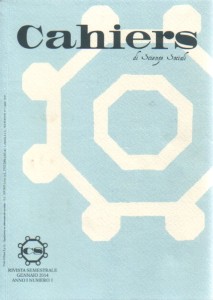Turning points: Syria and the Russian diplomacy. Stalingrad syndrome.
“Damascus is the “Stalingrad” of Russian diplomacy. After years of geopolitical withdrawal, Moscow has chosen Syria as a way to revive its image of power in the world. “Not one step back” is the Kremlin’s new strategy, as it was for the Red Army along the banks of the Volga river during World War II. To be more convincing, the Kremlin has simultaneously flexed its muscles by supplying sophisticated […]
Il South Stream va in archivio.
2 Dec 2014E’ stata scritta la parola fine sul progetto South Stream. La Russia ha per adesso rinunciato alla costruzione dell’avveniristico gasdotto che avrebbe portato il metano fino al cuore dell’Europa passando sotto al mar Nero ed in mezzo ai Balcani.
Troppi gli screzi con l’Unione Europea per il cosiddetto “Terzo pacchetto” dell’energia. Vladimir Putin si è arreso alla realtà ed al crollo delle quotazioni sui mercati internazionali. South Stream è per ora troppo costoso.
I riflessi economici e geopolitici sono importanti. La Saipemperde un contratto da 2 miliardi per la costruzione della tratta sottomarina; l’Eni evita di indebitarsi per rimanere dentro al consorzio. Geopoliticamente i Balcani non ottengono un futuro possibile collante per una regione da sempre instabile, l’idea di rendere l’Italia un “hub” energetico rischia di fallire con tutte le conseguenze del caso in un mondo sempre più globalizzato, la russa Gazprom rimane prigioniera dell’Ucraina.
Dopo la costruzione del Nord Stream verso la Germania la diversificazione delle vie di approvvigionamento del Vecchio Continente subisce così una pesante battuta d’arresto, aprendo la strada ad un dipendenza non più troppo marcata da Est, ma da Ovest. Il baricentro del mondo dell’energia si sposta lentamente dal Mediterraneo verso l’Atlantico, come successe ai commerci nel XVI secolo.
La conoscenza della storia avrebbe dovuto aiutare i politici italiani ad assumere le giuste posizioni.
Giuseppe D’Amato
Donald Tusk, New EU President.
1 Dec 2014 Today is my first day in office as President of the European Council. As you can imagine it is a very important day for me. And I hope that it is for you as well. If you are a little nervous about this replacement, the change of boss, don’t worry, I’m a little nervous, too. In fact it is a great honour for me to start working here. And of course a great challenge. 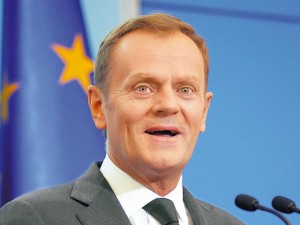 First and foremost because Herman Van Rompuy, our first permanent President, will be a tough act to And it is not a compliment, dear Herman, it is a fact. I am perhaps your greatest admirer in Europe. Not because you supported my election as your successor… or at least not only. It is no exaggeration when I say that you helped to steer us, to steer Europe out of the storm.
First and foremost because Herman Van Rompuy, our first permanent President, will be a tough act to And it is not a compliment, dear Herman, it is a fact. I am perhaps your greatest admirer in Europe. Not because you supported my election as your successor… or at least not only. It is no exaggeration when I say that you helped to steer us, to steer Europe out of the storm.
For five years – as one of the Prime Ministers around the table – I witnessed your skills: creating compromises; finding solutions; establishing trust, among often tough characters (I was no angel myself). Yes: Herman Van Rompuy in fact personifies traditional European political principles, which are also important to me: trust, common sense, moderation and decency. We all thank you for the excellent work you have done, Herman.
Dear colleagues, mes chers collègues, I also thank you for the great job you have done. I am aware of the importance of your work of protocol, of press, of interpretation, of translation, of security, of political advice, and all the other tasks and roles of this house. You were all an important part of Herman Van Rompuy’s success. And I d eeply believe that you will all be an important part of our future success. I come here with a strong sense of purpose. In these difficult times Europe needs success. And success for Europe, in the coming years, means in my opinion four things:
First, protecting our fundamental values: solidarity, freedom, unity against the threats to the Union and its unity coming from both inside and outside. Today, not only are eurosceptics questioning the EU’s value, the Union even has enemies. Politics has returned to Europe, history is back, and such times need leadership and political unity.
Second, we need ruthless determination to end the economic crisis. It is our responsibility to complete the genuine Economic Monetary Union. I take this task very seriously. And we must remember that our common currency, the Euro, is our advantage, not our disadvantage.
Third, the European Union must be strong internationally. Europe has to secure its borders and support those in the neighbourhood who share our values.
And fourth, the relations between Europe and the United States are the backbone of the community of democracies. Both we and the Americans are responsible for the future of our relations. The year ahead will be crucial. For all of these things, I will need your help at every step of the way. I already know a lot about your dedication, your determination, your expertise. That gives me great confidence. Confidence that we will work as a team.
Je me réjouis à l’idée de travailler avec vous. (That was French.)
Merci Dank u wel, Herman. Thank you. Dziękuję bardzo, Polsko.
Calling Pope Francis his “beloved brother in Christ,” the head of the Orthodox Church, Ecumenical Patriarch Bartholomew I on Sunday recalled their gathering last May at the Church of the Holy Sepulcher in Jerusalem on the fiftieth anniversary of the historic ecumenical meeting of their predecessors, Pope Paul VI and Patriarch Athenagoras. 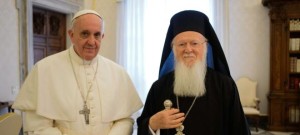
Welcoming the Pope after a celebration of the Divine Liturgy at the Patriarchal Church of St. George in Istanbul, Patriarch Bartholomew said “the path toward unity is more urgent than ever for those who invoke the name of the great Peacemaker.”
Citing the “diverse divisions, conflicts and animosities, frequently even in the name of God,” the Patriarch said Christians have a “great” responsibility “before God, humankind and history.”
He noted that the Orthodox Church is preparing for its Great Council planned for 2016 and asked Pope Francis to pray for its success. The Patriarch expressed satisfaction that members of both Churches are present as observers in each other’s synodal life and said he hoped that once full communion is restored, “the significant and special day” of holding a joint Great Ecumenical Council will “not be prolonged.”
In concluding, the Patriarch said “the challenges presented to our Churches by today’s historical circumstances oblige us to transcend our introversion in order to meet them with the greatest degree of collaboration. We no longer have the luxury of isolated action. The modern persecutors of Christians do not ask which Church their victims belong to. The unity that concerns us is regrettably already occurring in certain regions of the world through the blood of martyrdom.”
Vatican Radio – The complete text of Ecumenical Patriarch Bartholomew I’s address to Pope Francis.
Vatican Radio – Dichiarazione congiunta. Papa e Bartolomeo: no a Medio Oriente senza cristiani
“Due tendenze marcano l’attuale situazione energetica:
la prima è l’estensione e la drammatizzazione delle tensioni e dei conflitti nei quali l’energia appare come un parametro di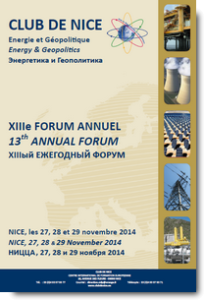 riferimento. Questo vale per il Medio Oriente, l’Ucraina, la Libia.
riferimento. Questo vale per il Medio Oriente, l’Ucraina, la Libia.
La seconda è l’accelerazione delle politiche di adattamento alla nuova realtà geopolitica, economica, scientifica ossia alla transizione energetica.
Quali rapporti di partenariato con la Russia? Il Mediterraneo cerca una propria collocazione: quali sono le sue aspettative ed prospettive?”
Il Club de Nice ne ha discusso per tre giorni.
Vedi anche:
Dominique Fache, Energie: du poker menteur à la roulette russe
La Russia alle prese col crollo del prezzo del petrolio ed al tramonto dei suoi futuri progetti.
RSI Audio Min. 13’50” – 17’00
Ukraine, The first session of the new Rada.
27 Nov 2014Ukraine’s eighth parliament has started work. A total of 419 new lawmakers were sworn in, including former pilot Nadiya Savchenko, who remains imprisoned in Russia. Oleksandr Turchynov, the speaker of the previous Verkhovna Rada conducted the first session.
27 seats remain vacant in the 450-seat session hall. The annexation of Crimea and Russia’s war against eastern Ukraine prevented deputies from being elected in those parts of the country that are no longer controlled by the authorities.
The Rada approved Arseny Yatseniuk for a new term as prime minister. Five parties have declared their intention to enter a coalition, which will then be responsible for appointing the prime minister, followed by the government.
President Petro Poronshenko, declared that there could be no future formula for Ukraine other than that of a single, unified state. 100 percent of Ukrainians favoured a unitary state without federalisation. “These are our warm wishes to those in the East or West who advise federalisation,” added Ukrainian chief of State, who advice people “to sleep with a revolver under the pillow.”
Farewell to the legendary Viktor Tikhonov.
24 Nov 2014 Russian ice hockey coach Viktor Tikhonov has died at the age of 84. 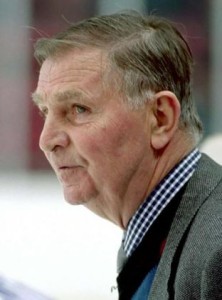
Tikhonov coached the Soviet Union to gold at the 1984, 1988 and 1992 Winter Olympics and passed away after a long-term illness. He is also remembered as the coach of the USSR team that lost the ‘miracle on ice‘ game against the United States in the semi-finals of the 1980 Games. Tikhonov guided the Soviet Union to eight world championships between 1978 and 1990.
As a player, Tikhonov won four Soviet titles between 1951-54 and guided CSKA Moscow to 13 consecutive Soviet titles between 1977 and 1989.
“The entire global hockey community has lost a great coach,” Vladislav Tretiak, who played goalie for Tikhonov’s Soviet team and now heads the Russian Hockey Federation, told Russia’s R-Sport news agency. Tikhonov’s funeral will take place on Thursday with a memorial service at CSKA Moscow, Russian media reported.
«В донецких больницах не хватает наркозных средств, нет всего спектра антибиотиков, нет в должном количестве гормональных средств и есть определенные проблемы со средствами родовспоможения. Детское молочное питание мы доставляем из Макеевки, сами понимаете, по объективным причинам наша детская молочная кухня не работает», — мерно декламирует пожилой дядечка в выглаженном костюме с галстуком. Дядечка — начальник Донецкого городского здравоохранения Нефёдов. Докладывает о состоянии дел под прицелом трех телекамер местных телеканалов он администратору города Донецка — Игорю Мартынову…. 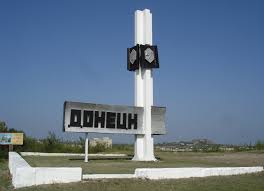
Что бы кто ни говорил официально в Москве и Киеве, но Россия, похоже, где вынужденно, где как, но берет на себя полное обеспечение самопровозглашенных республик.
Донецк меняется. Это особенно заметно, когда выпадаешь из него на неделю-другую. Все так же ночами и по утрам гремят «бахи». И все так же люди демонстративно пытаются их не замечать. Но на пересечении улицы Университетской и бульвара Богдана Хмельницкого уже открылся, например, новый большой магазин «Хата мяса и молока», открываются небольшие кафе и рестораны, работает пара кинотеатров (последний сеанс в 17.00). А администратор города рассказывает о «харьковских производителях колбасы, которые демпингуют и поджимают наших»….Таксисты уверяют, что отменили комендантский час….
Статья – Дмитрий Дурнев Московский Kомсомолец №26680 от 22 ноября 2014 – Dmitry Durnev Moskovskij Komsomolets.
G20 leaders’ Brisbane pledges.
16 Nov 2014Raising global growth ‘highest priority’
The communique confirmed G20 members have committed to lifting economic output to deliver an additional 2.1 per cent growth boost by 2018.
“Raising global growth to deliver better living standards and quality jobs for people across the world is our highest priority,” they said.
The target will add more than US $ 1.89 trillion to the global economy and create millions of jobs.
“We will monitor and hold each other to account for implementing our commitments,” they said.
At the same time, the G20 would be mindful of the spill-over effects of this growth on the global economy, including possible inflationary pressures.
This might require central bank actions on monetary policy.
“We stand ready to use all policy levers to underpin confidence and the recovery,” the G20 said.
Progress would be evaluated at next year’s summit in Turkey. 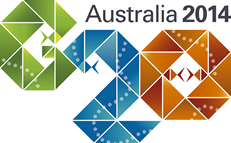
G20 committed to reducing gap in female employment
The G20 also appears to have heeded a United Nations call to deliver “quality” jobs and support women and jobless youth into work.
“We agree to the goal of reducing the gap in participation rates between men and women in our countries by 25 per cent by 2025,” it said.
This would bring more than 100 million women into the labour force.
A separate plan will encourage education and training for young people, with labour ministers due to report back to the G20 next year.
Focus on international trade
The G20 called for countries support international trade by lowering costs, streamlining customs procedures, reducing regulatory burdens and strengthening trade-enabling services.
“We are promoting competition, entrepreneurship and innovation, including by lowering barriers to new business entrants and investment,” they said.
There were also commitments to eradicate poverty and ensure the G20 contributed to inclusive and sustainable growth in poor and developing countries.
Another key area was taxation, with the G20 endorsing actions to close profit-shifting loopholes for big or multinational corporations and secure country tax revenue bases.
“Profits should be taxed where economic activities deriving the profits are performed and where value is created,” they said.
Concerns surrounding Ebola
The G20 stressed its concerns about the spread of the deadly Ebola virus in West Africa and the human and economic impact.
“We support the urgent co-ordinated international response and have committed to do all we can to contain and respond to this crisis,” they said.
“We call on international financial institutions to assist affected countries in dealing with the economic impacts of this and other humanitarian crises, including in the Middle East.”
G20 nations have backed strong action on climate change in the wake of the Brisbane leaders’ summit.
Climate change
“We support strong and effective action to address climate change,” the official communique released on Sunday said.
Climate change wasn’t on the formal agenda prepared by the Australian presidency, but supportive statements by US President Barack Obama this weekend ensured its inclusion in the final statement.
The leaders agreed their future actions will support sustainable development, economic growth and certainty for business and investment.
The G20 will work together to adopt a protocol under the United Nations Framework Convention on Climate Change to present at the Paris climate conference in 2015.
“We encourage parties that are ready to communicate their intended nationally determined contributions well in advance,” they said.
“We reaffirm our support for mobilising finance for adaptation and mitigation, such as the Green Climate Fund.”
The UN-backed fund was set up to help poor countries deal with the impacts of climate change, such as rising sea levels and severe weather events.
The US this weekend committed $US3 billion to the fund, and Japan $US1.5 billion.
Other commitments or policy actions included:
- strengthening the resilience of the global economy to future shocks
- increasing the stability of the international financial system
- recovering the proceeds of corruption and the denial of safe haven to corrupt officials
- a stronger multilateral trading system under WTO rules, getting Doha trade talks back on track
- improved functioning and stability of energy markets, such as oil and gas, to support energy security
EAST EUROPE. Dal crollo del Muro alle nuove sfide
Cahiers n.1/2014
Numero monografico in onore di Renato Mieli, Dario Staffa, Pina D’Amato
A cura di Stefano Monti Bragadin e Giuseppe D’Amato
Presentazione
Eugenio Boccardo
Introduzione
Stefano Monti Bragadin
TESTIMONIANZE – TESTIMONIES
Lech Wałęsa: il mio 9 novembre 1989
Fulvio Scaglione
Tadeusz Mazowiecki: la Ddr era al capolinea
Luigi Geninazzi
François Fejtö: dal crollo dell’Urss alla globalizzazione
Almerico Di Meglio
Dmitrij Likhaciov: il Novecento, per fortuna, è finito!
Giuseppe D’Amato
L’Ostpolitik vaticana: modus vivendi, modus non moriendi
Francesco Strazzari
Oltre il muro si piange
Luigi Geninazzi
Un ospite dal passato
Stefan Scholl
GERMANIA – GERMANY
Gian Enrico Rusconi: la Storia sopra Berlino
Erminio Ferrari
The Berlin Republic: Evolution of Germany’s Politics of Memory and German Patriotism
Krzysztof Zalewski
Zwanzig Jahre Friedliche Revolution Heutige Sichten der Ostdeutschen
Gunnar Winkler und Reinhard Liebscher
The German Vision of NATO’s Future: the Alliance as a Building Block of Germany and Europe’s Security
Justyna Gotkowska
CONVERSAZIONI – DIALOGUES
Luigi Bonanate e Marco Revelli: l’eredità del Muro, la lunga vita del secolo breve
Erminio Ferrari
James Bissett: anni Novanta, un decennio perso
Giuseppe D’Amato
Viktor Kremenjuk: verso un mondo multipolare
Giuseppe D’Amato
FERITE SANGUINANTI – BLEEDING WOUNDS
Rambouillet ’99: trattativa o ultimatum?
Maurizio Cerruti
Polonia 2007: esqueletos en la memoria
Giuseppe D’Amato
Andrzej Wajda: Katyń, the Defeat of the Silence
Giuseppe D’Amato
UNIONE EUROPEA – THE EUROPEAN UNION
Unificazione monetaria europea e riforma dell’architettura finanziaria internazionale
Sergio Rossi
L’Europa fra euro-propositivi ed euro-scettici
Ugo Poletti
RUSSIA
Perché è crollata l’Urss: le «lezioni» di Egor Gajdar
Giuseppe Gatti
The EU and Russia’s Post-Soviet Economic Policy
Marco Fantini
The Ideology of Putinism
Anne Applebaum
La natura della Russia: Solgenitsin vs Pipes
Anna Rapotoueva
Come superare la crisi nazionale: riflessione sulla strategia di sicurezza della Russia
Viktor Kremenjuk
La Russie postsoviétique et ses frontières: bouleversements et ambiguïtés du rapport au monde extérieur
Ann de Tinguy
The New Great Game: a Breakthrough?
Aleksandra Jarosiewicz and Krzysztof Strachota
Il trust nell’ex Patria del comunismo
Giuseppe Lepore e Simona Peschiera
ALCUNE DELLE NUOVE SFIDE DEL XXI SECOLO – SOME OF THE NEW CHALLENGES IN THE 21st CENTURY
Arthur Chilingarov: the Arctic Race. Russia in Pole Position
Giuseppe D’Amato
Robert N. Huebert: the Militarization of the Arctic. The Canadian Point of View
Giuseppe D’Amato
Rod Lyon: l’Australia e il Pacifico nel XXI secolo
Giuseppe D’Amato
Is China a Rival or Partner? From the Japanese Perspective
Masafumi Iida
US War on Terror and Indian Security Interest
Anand Kumar
Demography, Migration and Population Policies
Joseph Chamie
The New Appeal of Nuclear Energy and the Dangers of Proliferation
Oliver Thränert
Adesso i capi separatisti filo-russi dell’Ucraina orientale hanno la loro investitura popolare. Potranno giocarsela al tavolo dei negoziati con il governo centrale. Quanto siano state legali o legittime le elezioni nei “distretti speciali” – con uomini in armi ovunque, liste elettorali dubbiose, gente che poteva votare via Internet in modo fumoso – è ben che evidente. 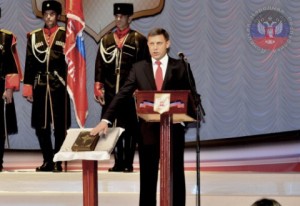
Ma la deformazione della democrazia e dei suoi processi di scelta della classe dirigente è il triste elemento nuovo di questa crisi, già emerso in marzo in Crimea ed in maggio nelle regioni di Donbass – Lugansk.
Dai “distretti speciali” più della metà della popolazione se n’è andata, sfollata in territori sotto controllo di Kiev o profuga in Russia. Chi è rimasto si sta adattando ad una realtà complessa: senza soldi (non vengono pagati né stipendi né pensioni), con poco lavoro, con servizi quasi nulli. Per tre mesi – con la speranza che l’incubo finisca – questi disgraziati hanno atteso la spallata decisiva dei governativi. Adesso guardano disperatamente ai russi, mentre tremano pensando alla possibile scelta di Kiev di chiudere il rubinetto energetico con il conseguente congelamento di edifici civili e delle poche attività produttive ancora in funzione.
Dall’estate scorsa Donetsk e Lugansk si sono riempite di materiale bellico di origine incerta, di mercenari del Caucaso, di personaggi d’armi strani. Sono loro le prossime vittime predestinate dello scontro tra Est ed Ovest, come già successo in passato Abkhazia e sta accadendo in Crimea.
Una soluzione politica è possibile? Quasi sicuramente no. I separatisti sono pronti a menare le mani, almeno questo lo si desume dalle prime dichiarazioni dei “neopresidenti”. I bollenti spiriti si calmeranno per la stagione fredda per riesplodere al disgelo: questa la previsione dei maggiori specialisti.
La guerra in Donbass e Lugansk serve al Cremlino per guadagnare tempo e rimandare la discussione del vero problema tra le due repubbliche slave: ossia la sovranità della Crimea. Vladimir Putin non può cedere ora su questo punto, altrimenti la sua carriera politica terminerà, soprattutto adesso che la crisi economica – provocata in particolare dal crollo del prezzo del petrolio e molto meno dalle sanzioni occidentali – sta iniziando a mordere. Il rublo è in caduta libera, il tasso d’inflazione alle stelle, il Pil russo è sceso a livelli sovietici.
Vi è il forte rischio che il tramonto della stella di Putin provochi il canto del cigno della Russia nel suo ex cortile di casa. E non si sa quanto questo secondo momento sia positivo per la stabilità continentale.
gda
Welcome
We are a group of long experienced European journalists and intellectuals interested in international politics and culture. We would like to exchange our opinion on new Europe and Russia.
Categories
- Breaking News (11)
- CIS (129)
- Climate (2)
- Energy&Economy (115)
- EU Eastern Dimension (85)
- Euro 2012 – Sochi 2014 – World Cup 2018, Sport (43)
- Euro-Integration (135)
- History Culture (198)
- International Policy (261)
- Military (74)
- Interviews (18)
- Italy – Italia – Suisse (47)
- Odd Enough (10)
- Poland and Baltic States (126)
- Religion (31)
- Russia (421)
- Survey (4)
- Turning points (4)
- Ukraine (176)
- Российские страницы (113)
Archives
- November 2020
- October 2020
- September 2020
- August 2020
- July 2020
- May 2020
- April 2020
- March 2020
- January 2020
- December 2019
- November 2019
- October 2019
- September 2019
- August 2019
- July 2019
- June 2019
- May 2019
- April 2019
- March 2019
- February 2019
- December 2018
- November 2018
- October 2018
- September 2018
- August 2018
- July 2018
- June 2018
- May 2018
- April 2018
- March 2018
- February 2018
- January 2018
- December 2017
- November 2017
- October 2017
- September 2017
- August 2017
- July 2017
- May 2017
- March 2017
- January 2017
- December 2016
- November 2016
- October 2016
- September 2016
- July 2016
- June 2016
- May 2016
- April 2016
- February 2016
- January 2016
- November 2015
- October 2015
- September 2015
- June 2015
- April 2015
- March 2015
- February 2015
- January 2015
- December 2014
- November 2014
- October 2014
- September 2014
- August 2014
- July 2014
- June 2014
- May 2014
- April 2014
- March 2014
- February 2014
- January 2014
- December 2013
- November 2013
- October 2013
- September 2013
- August 2013
- July 2013
- June 2013
- May 2013
- April 2013
- March 2013
- February 2013
- January 2013
- December 2012
- November 2012
- October 2012
- September 2012
- August 2012
- July 2012
- June 2012
- May 2012
- April 2012
- March 2012
- February 2012
- January 2012
- December 2011
- November 2011
- October 2011
- September 2011
- August 2011
- July 2011
- June 2011
- May 2011
- April 2011
- March 2011
- February 2011
- January 2011
- December 2010
- November 2010
- October 2010
- September 2010
- August 2010
- July 2010
- June 2010
- May 2010
- April 2010
- March 2010
- February 2010
- January 2010
- December 2009
- November 2009
- October 2009
- September 2009
- August 2009
Our books





